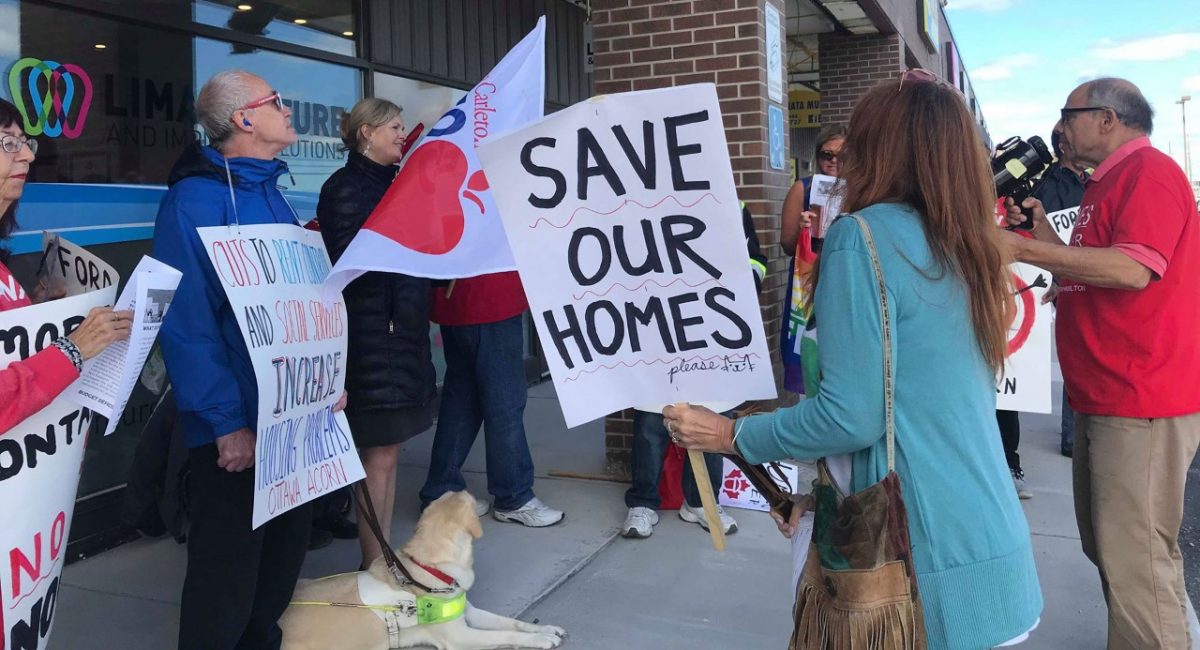“I often have people come up to us and say, I love what you’re doing, can I give you a few thousand out of my RRSPs to invest,” says Ray Sullivan, Executive Director of the Ottawa Community Land Trust (OCLT). The problem for most non-profit affordable housing organizations, he says, is that they don’t currently have a pathway to allow their supporters to do this. We sat down with Ray, and Ottawa Community Land Trust Board Members, Lisa Ker and Glenn Grignonn to explore how Community Bonds might create a new avenue to engage their community while also unlocking much needed capital.
The Ottawa Community Land Trust was established in 2021 with the mission to preserve, maintain and support the creation of diverse and affordable housing in the Ottawa region. Their business model is straightforward – acquire properties that have existing affordable market rents, remove them from the private market, protect existing tenants, and then lease the properties out to local non-profits and co-operatives to manage.
ACORN Canada’s report on the housing crisis in Ottawa is dire. Market rents rose by 26% between 2005 and 2015, while median income only increased by 4%, and supply is not nearly high enough to meet demand. To add to the difficulties, the vast majority of affordable housing providers in Ottawa, and Ontario at large are small housing providers, operating less than a hundred units, meaning it is very difficult for them to achieve economies of scale and compete with the private market. “Of the roughly 750 members of the Ontario Non-profit Housing Association, 700 of them operate less than 100 units of housing,” shares Glenn.

OCLT is particularly interested in acquiring small to mid-sized apartment buildings. “If they were bought by a commercial investment group, they would solely be interested in their return on investment and aggressively try to turn those units over and raise rents to increase the cash flow from the property,” says Ray.
Most of the properties they are looking at will be eligible for traditional debt financing for 60% to 70% of the total property value, and OCLT is currently collaborating with the Ottawa Community Foundation to develop impact investment tools to cover the remaining gap. “If we were to rely on government sources, it would take over a year to secure the funds, and we would lose the properties,” says Ray, “we need to be able to mobilize quickly.”
Ray, Lisa and Glenn all share the opinion that these are not “fundraisable” projects. “People who want to make significant contributions and gifts to organizations and causes get excited about being part of a construction project where you can generate a lot of buzz,” says Lisa, speaking from years of experience leading fundraising initiatives. “It seems that acquisition of existing affordable housing doesn’t have quite the same appeal. This is a big problem because every year, Canada is losing 64,000 units of affordable housing – and 20,000 are in Ontario alone. That means for every one unit built, four are lost.

Ray shares that he would like to see the impact investment capital developed with the Ottawa Community Foundation become a revolving fund to help them acquire multiple buildings and protect as many units as possible. After acquiring the building, OCLT would repay the initial impact investors with funds raised by issuing Community Bonds. The idea is beneficial in a number of ways, first being that the initial capital would then be available for future acquisitions, and second, it would reduce the risk to community investors because the acquisition would already be complete. “These buildings are already rented out and have a consistent revenue stream, so we feel confident,” says Ray.
The team also sees the potential to use community bond funds for renovations on the buildings. “There is boundless potential for improvements in energy efficiency in affordable housing,” says Lisa. The team agrees this is an area that really needs more attention, but expertise is scarce. “I think there’s a lack of capacity in the sector,” says Glenn, referring to both energy efficiency retrofits and Community Bonds, “and when people don’t understand it, they don’t want to do it.”
Lisa Ker was formerly the Executive Director of Ottawa Salus, a supportive housing provider. “We never sufficiently ventured into the world of social finance,” she shares, “we didn’t have the tools, resources and education to understand how to mobilize that type of capital.”
“Like many things in the sector, once you get the momentum going, then people want to get on board,” says Glenn. The team seems excited to plough the way in terms of Community Investment.
We wrap up the session with everyone being excited about the potential of Community Bonds. “The way you have brought this down to the community level and made it accessible to smaller and medium-sized housing providers – well- that’s just pretty cool,” says Ray.
About this Blog Series
In October 2021, Tapestry was selected to take part in a Canadian Mortgage and Housing Corporation (CMHC) program called the Housing Supply Challenge. This innovative competition encourages residents, interested parties, and experts from across the country to propose creative solutions to housing. The goal: to help meet Canada’s pressing need for safe and affordable homes by breaking down barriers to the creation of new supply.
Tapestry participated in Round 2 of the program, Getting Started, which seeks to find solutions to pre-development challenges, such as community resistance and obtaining financing. The program granted incubation funding to the 29 organizations selected to allow them to further develop and test their solution proposals.
Through six months of research and consultation, we had the opportunity to speak with over 40 interested parties in the affordable housing sector, from housing providers, to development consultants, to funders and lenders. Each and every individual and organization consulted helped to co-design our solution proposal.
The “Financing Affordable Housing with the Power of Community” blog series shares the lessons learnt and stories heard from some of the amazing organizations that we have partnered with.

